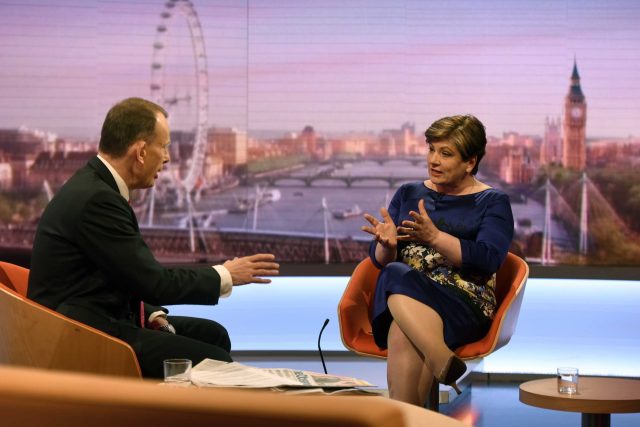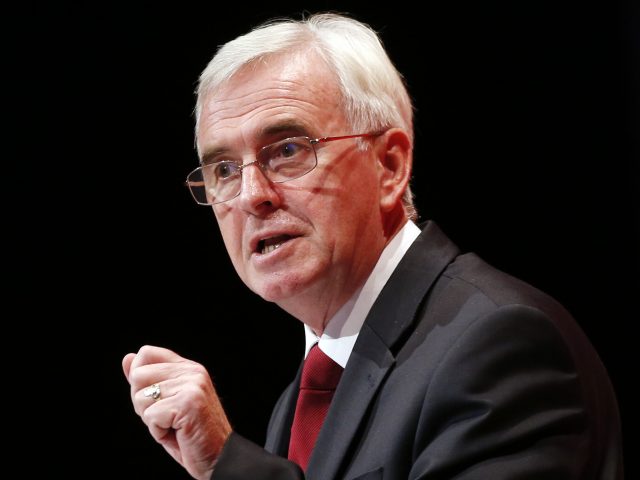Labour and Tories locked in bitter clashes as campaigning gets personal
Jeremy Corbyn’s party set out plans for a “Robin Hood Tax” on financial transactions, while the Tories plan to build new council homes.

Labour and the Tories have been involved in bitter clashes as they both set out policies aimed at winning over “ordinary” voters.
Jeremy Corbyn’s party set out plans for a “Robin Hood Tax” on financial transactions, raising billions for public services through a raid on the City, while Theresa May attempted to woo Labour voters with plans for a new generation of council homes.
But in an increasingly personal General Election campaign two of the most senior politicians on either side of the political divide were involved in a television bust-up which saw Labour’s shadow foreign secretary Emily Thornberry accuse Defence Secretary Sir Michael Fallon of talking “bollocks”.
The Tories have sought to portray the election as a straight choice between Mrs May and Mr Corbyn, focusing on the characters of the two leaders and the supposed risk that the Labour leader would pose in Number 10.
Sir Michael claimed Mr Corbyn had shown “quite open support for the IRA” in the past – a suggestion disputed by Ms Thornberry who told him: “You really can’t just go around making this stuff up.”
Sitting alongside Sir Michael on BBC One’s Andrew Marr Show, Ms Thornberry told him: “You have just said, for example, that I want to negotiate the future of the Falklands. That is bollocks.”

Sir Michael said a victory for Mr Corbyn would be “too great a risk for this country” but was forced to defend himself after Ms Thornberry brought up his participation in a trip to see Syrian leader Bashar Assad in 2007.
“There is a huge moral difference between talking to other foreign leaders – I meet them all the time as Defence Secretary – and Jeremy Corbyn’s quite open support for the IRA,” he said.
Under Labour’s plans, a financial transaction tax would bring in up to £26 billion over the course of the next parliament, while eliminating the most destabilising forms of speculation on the financial markets, shadow chancellor John McDonnell said.

“All we’re asking for is fairness in our tax system. By making those who trade in financial derivatives pay a small fraction of their profits, we can help properly fund our public services.”
The Conservatives said it was “madness” and warned that it would lead to the loss of jobs and economic growth, while Labour Mayor of London Sadiq Khan has previously warned against a “unilateral tax on business in our City”.
Mr McDonnell told Sky News’ Sophy Ridge on Sunday: “It’s not about punishing bankers or anything like that, it’s simply, correcting basically, tackling a couple of loopholes that there is in the existing system.
“You know look – we bailed out the city 10 years ago when the crash came, we poured hundreds of billions of pounds into it. Since then £100 billion has been given out in bonuses in the City. So we are asking for a small contribution…to fund our public services.”
Mrs May unveiled Tory proposals to support local authorities in building a new generation of council homes to help fix the “broken” housing market, claiming “too many ordinary working families are stuck on council waiting lists, facing unaffordable rents and struggling to save for that first deposit”.
The party said it expected “thousands” of new homes to be built each year in move that will be seen as a symbolic break with the legacy of Margaret Thatcher who introduced right-to-buy – although tenants will eventually be able to purchase the properties.
But there would be no new money for the policy, which would be funded from £1.4 billion outlined in last year’s Autumn Statement and ministers refused to specify exactly how many new homes would be built.





